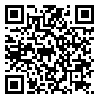BibTeX | RIS | EndNote | Medlars | ProCite | Reference Manager | RefWorks
Send citation to:
URL: http://jdisabilstud.org/article-1-3116-en.html
2- Assistant Professor of Psychology Department, Shahrood Branch, Islamic Azad University, Shahrood, Iran
3- Professor of the Department of Psychology, Hoza Research Institute and University, Tehran, Iran
4- Assistant Professor, Department of Islamic Studies, Shahrood Branch, Islamic Azad University, Shahrood, Iran
Abstract
Background & Objectives: Virtual social networks consist of sites where users can share their interests, thoughts and activities with other people. Among the users of virtual networks, teenagers may be extremely attracted to its use. Therefore, considering the negative consequences of addiction to virtual networks and because addiction to virtual networks is a new disorder, its treatment methods have not yet expanded much, but research has shown that cognitive behavioral therapy for users who are obsessed with Virtual network use is effective. In cognitive behavioral therapy, a well–known treatment method, it is assumed that thoughts determine emotions, and by controlling ineffective thoughts and managing behavior, the amount of dependence on virtual networks can be reduced. Therefore, the research aimed to determine the cognitive behavioral therapy program on ego identity status and mental well–being in people dependent on virtual networks.
Methods: The current research was semi–experimental and conducted with a pre–test–post–test design with control and experimental groups. The study's statistical population included people affiliated with virtual networks who referred to counseling and psychology clinics in Tehran in 2021. Among the statistical population, 30 qualified volunteers entered the study as available and were randomly assigned to two experimental and control groups (each group included 15 people). Inclusion criteria were: 1. a higher–than–average score on the Questionnaire of Addiction to Mobile–Based Social Networks; 2. at least a diploma level of education; 3. not participating in other therapeutic interventions simultaneously. Exclusion criteria were: 1. absenteeism more than out of three sessions; 2. it was non–observance of group therapy rules. Both groups completed the pre–test and post–test of the Ego Identity Status Questionnaire (Bennion & Adams, 1986) and the Subjective Well–Being Questionnaire (Molavi et al., 2010). The experimental group received cognitive behavioral therapy in twelve ninety–minute sessions; However, the control group did not receive any treatment program during the research. Data analysis was carried out in two parts: descriptive statistics and inferential statistics. At the level of descriptive statistics, frequency, mean and standard deviation were used, and at the level of inferential statistics, covariance analysis was used in SPSS software version 24. The significance level was 0.05 for the tests.
Results: The results of the analysis of covariance for each of the variables of ego identity status and mental well–being showed that there was a significant difference in the subscales of ego identity status including diffusion (p=0.005) and achievement (p<0.001) between the experimental and control groups in the post–test, after removing pre–test effect; Also, after removing the effect of the pre–test, there was a significant difference in the mental well–being subscales including vitality (p=0.024), life determination (p<0.001) and neuroses (p=0.004) between the experimental and control groups in the post–test.
Conclusion: According to the results, cognitive–behavioral therapy can enhance the ego identity status and mental wellness of individuals who rely heavily on virtual networks by correcting their dysfunctional thoughts.
| Rights and permissions | |
 |
This work is licensed under a Creative Commons Attribution-NonCommercial 4.0 International License. |



